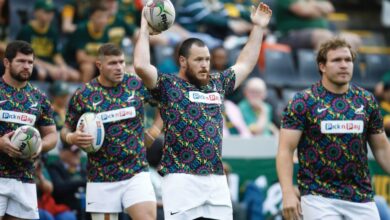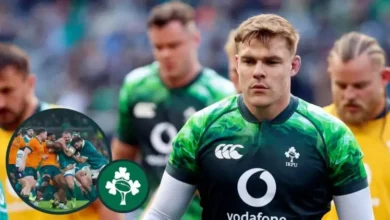Rugby World Cup: Springboks hooker Bongi Mbonambi reignites racism row with ‘Wenkant’ shirt

South Africa have continued to mock England flanker Tom Curry’s claim that he was racially abused by Bongi Mbonambi during the team’s trophy parade in Cape Town.

Geordin Hill-Lewis, the mayor of Cape Town, gave Springboks hooker Mbonambi a shirt that said “Wenkant,” which translates from Afrikaans as “winning side.”
Following an open-top bus parade, the Rugby World Cup winning team gathered outside City Hall. Hill-Lewis introduced himself and said he wanted to give Mbonambi a gift before bringing him forward and announcing to the crowd, “Bongi’s on the wenkant!”
Mbonambi grinned, took the jersey, and bowed to the applauding audience.
World Rugby announced in the week of the World Cup final that the investigation into Mbonambi had been closed due to “insufficient evidence”, with one theory offered by South African supporters being that Curry had
I overheard Mbonambi refer to the white side as “wit kant” in Afrikaans.
“Wenkant” jerseys, which retail for R200 (NZ$18), were being sold in South Africa leading up to the World Cup final last week. There is also an alternative design that has “Wit Kant” on the white side and “Groen Kant” on the green side on the back.
At the time, the Rugby Football Union vehemently defended Curry, telling World Rugby that the same player had also mistreated Curry during England’s November 2022 match against South Africa. They also expressed disappointment with the governing body’s decision to end the investigation and denounced
Curry and his family have experienced “disgusting abuse” on social media.
At the time, SA Rugby supported Mbonambi as well, calling the hooker a “decorated, experienced, and respected test player” who had “denied the allegations from the outset.” SA Rugby has complete faith in Bongi’s honesty and moral character.
In the lead-up to the championship game, South Africa’s captain, Siya Kolisi, disclosed that he had gotten in touch with Curry following the mistreatment the Sale flanker had experienced on social media.
READ ALSO:
Ciaran Kearney: Deeper meaning fuelled Springboks’ mission
The last time the All Blacks and Springboks competed in the Rugby World Cup Final was 1995, a year after the end of apartheid in South Africa.

With the Indian Ocean temptingly close to the back of King’s Park, Bongi Mbonambi stood beside me chatting. Bongi was brought up in Bohlokong township in Bethlehem, 400km from where we stood at his current club, the Durban Sharks. His township had no grass pitch. Only he and one other got to attend a Model C school, where they had rugby. For Bongi, rugby saved him from the worst side of life, fuelling his passion and love for the game.
On the morning Bongi and I caught up, the Springbok hooker and South Africa’s vice-captain had his right leg in a full-length brace. Unfortunately, it was the same leg which he injured 90 seconds into last week’s Rugby World Cup final as All Black Shannon Frizzell hurt him in a dangerous clear-out. Frizzell got a yellow card while Bongi got taken off. He took no further part in the match but reappeared later, on the sideline, enthusiastically encouraging his teammates playing the game. Such is the depth of psychological connection in this South African rugby team, that Bongi’s presence pitch-side was emblematic. Throughout the campaign, South Africa’s ‘squad depth’ was there for all to see. Less visible to outsiders was the depth of meaning in this Springbok team’s mission.
The last time the All Blacks and Springboks competed in the Rugby World Cup Final was 1995, a year after the end of apartheid in South Africa. While apartheid endured, an international sporting boycott enhanced support for democratic change. Back then, the Springboks were synonymous with a political regime which legalised white supremacy. Political transformation provided an opportunity to change this. As President of a new government of National Unity, Nelson Mandela lobbied for the 1995 Rugby World Cup to be staged in South Africa. The relationship Mandela forged with Springboks captain Francois Pienaar was brilliantly dramatised in the movie ‘Invictus’. Before the final, President Mandela walked into the Springboks changing room wearing the team jersey with Pienaar’s number 6 on the back. His gesture reinforced the vision of a shared mission.
That moment still has special resonance for South Africa. To see Mandela present the Webb Ellis Cup to Pienaar projected a much-needed vision of the post-apartheid rainbow nation. But the team itself didn’t reflect this vision. The only person of colour was Chester Williams. Bongi Mbonambi and the Springboks captain Siya Kolisi were both four years old at the time. As Kolisi has openly admitted, he had no dream of playing for his country, much less being the first person of colour to captain the Springboks to a historic fourth title and back-to-back championships.
Kolisi’s personal journey has embodied the life struggles of many people in post-apartheid South Africa. His mother was a 16-year-old girl who gave him over to be raised by his father’s mother. By the age of eight, he was smoking with his friends. Soccer was the popular sport in his Zwide township, but Kolisi preferred the skills of rugby. Like Bongi, school became his salvation and his springboard in rugby. Kolisi was the first recipient of a Vincent Mai bursary to attend Grey’s High in Port Elisabeth. He still describes Vincent Mai as the person who changed the course of his life.
In turn, Kolisi himself has created a philanthropic foundation, in part to campaign against gender-based violence in South Africa. Again, his purpose is deeply driven by the goal of collective impact. He saw his own mother have teeth beaten out of her mouth by a man. Success in sport helps Kolisi garner support for his foundation. Winning
is his means of advancing his moral principles and connecting them to a larger social good.
These kinds of things are far too frequently disregarded when analyzing high-performance teams. Performance goals are lifted, if not completely abstracted, from a distinct statement of individual and group purpose. The psychology of meaning is more complex than cognitive abilities. The absence of comprehension regarding group and team dynamics, including purpose, values, meaning, and belonging, cannot be made up for with any number of changing room posters, mysterious symbols, team contracts, or “secret” performance calls. These are all based on the science of behavior in humans. Psychology has made an effort to understand how people, place, context, and time interact, starting with the work of Kurt Lewin and continuing with Uri Bronfenbrenner.
Recently, at an event at St Mary’s University College in Belfast, sport psychology in high performance was discussed. More than 300 people gathered to hear an expert panel, underlining growing interest in the subject in Ireland. One of those panellists, Dr Kate Kirby, spoke about her support work since 2017 with Irish athlete Ciara
Portaferry, County Down, is home to Mageean. She stated that positive change takes time. Family visits to Ireland’s camp for this year’s Rugby World Cup, according to former Ulster and Irish rugby player Chris Henry, were viewed as a distraction during the 2015 campaign. He pointed out that the situation has changed and that Ireland’s current squad undoubtedly profited from these familial ties.
Although context is complicated, elite performers can misunderstand or disregard contextual intelligence. Understanding the background and cultural distinctions between groups and individuals from the “southern hemisphere” and those from the “global north” requires work.
I have visited South Africa multiple times since 1996, exploring the entire nation. Upon Kolisi’s statement
He is alluding to the people in the townships who get up at 4 a.m. to catch busses to work, maybe doing two or three jobs, when he says that hard work is ingrained in the DNA of the Springboks. He claims those folks are watching the Springboks play. If their team doesn’t put in a lot of effort, they don’t get it. This season, the club has outperformed its opponents in tackles and turnovers, which embodies their team identity on the field.
For Siya Kolisi’s side, the World Cup victory holds great significance since it represents hope and optimism for 60 million South Africans. After a generation, the triumph of the Springboks continues to represent the belief that, in Nelson Mandela’s words, “It always seems impossible until it’s done.”




